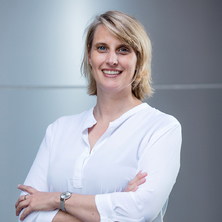
Overview
Availability
- Associate Professor Anne Lagendijk is:
- Available for supervision
Qualifications
- Doctor of Philosophy, Utrecht University
Research interests
-
Cellular mechanisms to maintain a healthy vasculature
Our vascular system transports approximately 7500 liters of blood each day. Arteries deliver oxygen and nutrients throughout the body after which the venous system returns the deoxygenated blood back to the heart. Architecturally, these blood vessels are extremely heterogeneous. The Lagendijk group investigates the development and maintenance of a functional blood vessel network in zebrafish and bioengineered human microvessels. The cells that make up our blood vessels continuously adapt their size, adhesiveness and compliance order to ensure the right balance between vessel integrity and permeability in a context dependent manner. Mechanical cues play a major role in the functional adaptation of blood vessels. Despite ongoing research unraveling the structural components of mechanical hubs in the cells, it is essential to assess the magnitude of forces that are transduced at these sites and the biological consequences for vessel function. Dr. Lagendijk has previously developed a VE-cadherin tension biosensor line in zebrafish. This line provides the first vertebrate model that reports intra-molecular tension and was utilised to identify changes in junctional organisation and VE-cadherin tension that occur as arteries mature and revealed molecular pathways that allow for this maturation to happen. In addition, the lab has established disease models for vascular malformations that are known to lead to neurological deficits and stroke. Modelling in zebrafish allows analyses of the initiating mechanisms of these vascular pathologies at unprecedented cellular and subcellular resolution.
Funding
Current funding
Past funding
Supervision
Availability
- Associate Professor Anne Lagendijk is:
- Available for supervision
Before you email them, read our advice on how to contact a supervisor.
Available projects
-
Uncovering how caveolae regulate adhesion dynamics during blood vessel morphogenesis
Caveolae are vesicular invaginations of the plasma membrane. We recently identified that caveolae are required for appropriate adhesion dynamics during blood vessel morphogenesis. This project will apply high end live imaging of zebrafish and 3D human micro-vessels to uncover the cellular mechanisms controlled by caveolae in this process.
Supervision history
Current supervision
-
Doctor Philosophy
Unravelling the cellular mechanisms that drive Cerebral Cavernous Malformations
Principal Advisor
Other advisors: Professor Robert Parton
-
Doctor Philosophy
Characterisation of a molecular pathway controlling cell-cell adhesion in veins but not arteries
Principal Advisor
Other advisors: Professor Alpha Yap
-
Doctor Philosophy
How the interaction between blood flow forces and ECM controls vessel assembly and function during development
Associate Advisor
Other advisors: Dr Mel White
Completed supervision
-
2025
Doctor Philosophy
Investigating the mechanosensory properties of blood vessels
Principal Advisor
Other advisors: Dr Samantha Stehbens, Dr Emma Gordon
-
2025
Doctor Philosophy
Uncovering dynamic changes in tumour associated vasculature using zebrafish models
Principal Advisor
Other advisors: Dr Laura Genovesi, Dr Emma Gordon
-
2021
Doctor Philosophy
Cell Polarity and Cell-Matrix Adhesion in Vascular Development
Principal Advisor
-
2025
Doctor Philosophy
The role of c-Src in facilitating endothelial dysfunction in aortic disease
Associate Advisor
Other advisors: Dr Emma Gordon, Dr Lilian Schimmel
-
2020
Doctor Philosophy
Defining the early molecular events governing AVC formation in zebrafish
Associate Advisor
-
2019
Doctor Philosophy
Elimination of apoptotic epithelial cells: Regulation of apoptotic extrusion and immune responses to epithelial apoptosis
Associate Advisor
Other advisors: Professor Alpha Yap
-
2018
Doctor Philosophy
Characterisation of novel regulators of cardiovascular development in zebrafish
Associate Advisor
-
2017
Doctor Philosophy
Characterisation of novel molecular mechanisms of lymphatic vascular development
Associate Advisor
Media
Enquiries
For media enquiries about Associate Professor Anne Lagendijk's areas of expertise, story ideas and help finding experts, contact our Media team:
